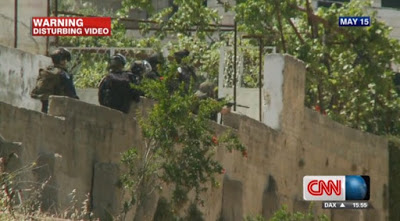Nuwara family fights secret plea deal with Israeli officer who killed their teenage son during Nakba Day protest
 |
| Yumna Patel on January 10, 2018 |
JERUSALEM — After a near six-hour hearing, Israel’s Jerusalem District court decided to adjourn proceedings until April 22, regarding the killing of Palestinian teenager Nadim Nuwara, 17, who was shot dead by an Israeli border police officer in May 2014.
Nuwara was shot and killed by Israeli officer Ben Deri during a demonstration marking the 66th anniversary of the Nakba outside of the Ofer detention center near Ramallah. Mohammad Salameh, 15, was killed alongside Nuwara during the protests, though no one was arrested in connection with his death.
Following Nuwara’s killing, which was widely publicized after it was caught on CNN and CCTV surveillance camera footage, Deri was arrested and initially charged with second-degree murder.
However, his charges were later significantly reduced, when the Israeli prosecution struck a surprise plea deal with the officer in January 2017 where he pled guilty to negligent murder and aggravated assault charges.
The Nuwara family contested the deal, as it was reached without their knowledge, and were expecting the court to reach their final decision on Tuesday.
Nadim’s father Siam told Mondoweiss of a grueling, six-hour long court hearing in which he and his family were “forced to face the murderer for the first time” in real life.
“My family and I feel very frustrated, and my wife is very sick right now,” Siam told Mondoweiss, adding that “the judge was a good listener, but he gave the defense a very long time to speak.”
Siam reiterated his rejection to Deri’s plea deal, saying that the “unlawful killing” of his son should carry a sentence of 13 to 20 years in prison, while under the negligent murder charge Deri will face only zero to five years.
The prosecution requested that Deri be sentenced to 20 to 27 months in prison, a request that allegedly infuriated Deri’s lawyer, Zion Amir, who insisted on a more lenient sentence, though he did not specify his suggested sentence, according to The Jerusalem Post.
The Jerusalem Post reported that Amir asked the court to permit his client to break off from the plea deal, though the court rejected the request.
During Tuesday’s hearing, Nadim’s father Siam expressed concern that Deri will receive an unfairly lenient sentence.
The Jerusalem Post quoted Siam, who addressed the court during the hearing, as saying “If Nadim had killed Ben Deri and was convicted of negligent homicide, would the court act the way it has with Ben Deri?”
“I fought hard for my son and for every Palestinian child,” Siam told Mondoweiss, expressing that Nadim’s case is representative of the larger systematically criminalization of Palestinian youth at the hands of Israeli forces that leads to their untimely deaths.
Israeli security forces initially denied responsibility for the Nadim’s death on the grounds that live fire wasn’t used during the demonstration, despite eyewitness testimony and video evidence of the killing.
Israeli Defense Minister Moshe Yaalon said at the time that it was possible that the video had been doctored, without providing an explanation on how the teens were killed.
The Israeli army claimed that the video was “edited in a tendentious manner” and “does not reflect the level of violence that occurred at the disturbance,” despite surveillance camera footage showing that at the time he was shot, Nuwara was not actively engaged in the clashes.
After Nuwara’s killing, former Israeli ambassador to the United States, Michael Oren, told CNN in May that he suspected the deaths of the teens “may have been staged.”
Following countless conspiracy theories and denial of responsibility on the part of Israeli officials and agencies, an autopsy of Nuwara’s body was conducted, and showed the youth had in fact been hit and killed with a live bullet.
The indictment against Deri states that the Israeli officers present at the demonstrations were given clear orders to fire only rubber bullets at the protesters.
Deri and his defense team claimed that he mistakenly killed Nuwara, and that he “did not know” he was firing live rounds after “accidentally” switching out the rubber bullet magazine with live bullets.
In the aftermath of Nuwara and Salameh’s death, Human Rights Watch concluded that their killings were carried out “willfully” and could possibly amount to war crimes.
The Israeli court system has received international criticism for its longstanding policy of immunity for Israeli forces, amidst a widespread distrust of the system among Palestinians.
A joint investigation by Israeli rights group B’Tselem and Hamoked in 2016 reported that Israel’s court system routinely postpones or slows down investigations regarding violations against Palestinians, with the intent of pushing families or individuals to eventually drop their case.


